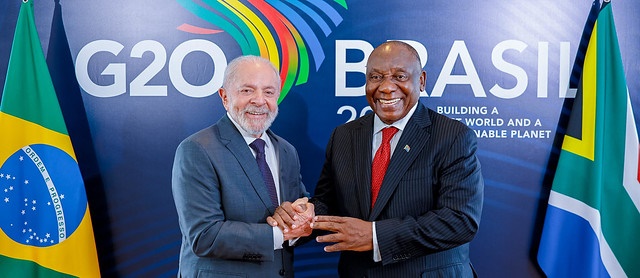This week marks a historic milestone for Africa as the continent takes its place at the G20 Summit as a permanent member for the first time. Following the African Union’s inclusion in September 2023, the continent is poised to influence global priorities, including debt distress, climate finance, inequality, and international taxation.

As world leaders gather in Rio de Janeiro, Brazil, on November 18-19, 2024, Africa is expected to advocate for increased investments in its energy sector – pivotal for advancing global energy transitions. Representing 85% of global GDP, over 75% of international trade, and two-thirds of the world’s population, the G20 holds unmatched sway in shaping global policy.
This year’s summit also paves the way for the 2025 G20 meeting in South Africa – the first-ever hosted on African soil. Under the theme “Fostering Solidarity, Equality, and Sustainable Development”, South Africa’s presidency will prioritise addressing the triple challenges of poverty, unemployment, and inequality, in alignment with the African Union’s Agenda 2063, “The Africa We Want”. This is a pivotal moment for Africa to solidify its role as a key player in driving global economic and sustainable development reforms.
“Africa’s priorities in the global financial system are clear: increasing concessional finance, solving the debt crisis, making risk and valuation assessments fairer, curbing illicit financial flows, and developing an international tax framework that ensures African countries get their fair share of global taxes. With these reforms in place, African countries’ transformation can be fully unleashed,” says Mavis Gyamfi- Owusu, President and CEO, Africa Centre for Economic Transformation.
Debt sustainability in developing economies, particularly across Africa, remains a priority. Leaders are expected to discuss comprehensive reforms to global lending practices.
“The handover of the G20 presidency from Brazil to South Africa marks the end of an era. South Africa’s presidency of the G20 will be the last under a developing country. The G20 coming to Africa is especially important because this time, in addition to South Africa, we have the African Union Commission taking part as a full member.
“The incoming South African presidency offers the opportunity to emphasize the debt crisis in Africa and push for a more comprehensive reform package. The African Union Commission needs to enhance progressive discussions on global financial architecture reform in different fora, focusing on making Africa a rule maker, not a rule-taker,” Jason Braganza, Executive Director of the African Forum and Network on Debt and Development (AFRODAD), said.
Dr. Magalie Masamba Senior Fellow, African Debt Justice Network (AfSDJN) and is an Advocate of the High Court of Zanzibar, submited: “African countries are navigating a complex intersection of development demands and the escalating impacts of climate change. Our nations require substantial financing to build resilient infrastructure, adapt to shifting climate conditions, and invest in sustainable growth. Yet, for many African countries, high debt burdens limit these options, leaving few viable paths forward without risking further economic strain.
“We need a global commitment to mobilise resources that do not add to existing debt burdens, enabling African countries to pursue economic progress and climate resilience without sacrificing economic stability. This requires a tailored approach to financing – one that prioritises grants, concessional financing, and possibly debt relief over traditional loans. This is not only essential for our region but is critical for sustainable global growth.”
As a new G20 member, the African Union is expected to seek support for its UN-backed resolution on international tax cooperation. This initiative aims to foster fairness and inclusivity in global tax systems.
Africa’s vulnerability to climate change will be prominently featured, with calls for equitable energy transitions and affordable climate finance.
“With South Africa following up on Brazil and putting inequality at the centre of its G20 presidency, South Africa and Africa have an opportunity to shape the agenda at this first-ever G20 meeting on African soil.
“Debt is a key issue for the continent, and South Africa will be expected to open up dialogue around the G20 Common Framework. Similarly, the G20 should reflect on how to cushion debt risk for the future and discuss options to reduce the cost of capital for the climate transition as a way to ensure an equal transition for all,” noted Faten Aggad, Executive Director of the African Future Policies Hub.
African leaders aim to oppose carbon tax regimes threatening their export competitiveness while advocating for trade policies prioritising development.
“Africa needs a unified voice. We must coordinate our demands on the G20. Our priorities should be reforming the global sovereign lending market to avoid exorbitant interest rates and securing substantial climate finance for adaptation. We must also actively oppose carbon tax regimes that could harm our exports,” said Ken Opalo, Assistant Professor at Georgetown University,
As South Africa prepares to assume the G20 presidency in 2025, this year’s summit will set the tone for a historic moment. South Africa’s leadership will underscore African priorities, including debt relief, global financial reform, and climate justice.
“The African Union’s full membership strengthens Africa’s ability to advocate for meaningful reforms and global equity. This is a critical moment for the continent to position itself as a leader in global decision-making,” added Jason Braganza.
The 2024 G20 Summit is poised to address urgent global challenges while paving the way for Africa’s leadership in shaping future global policies. As the African Union takes its place at the table, the continent’s voice will be central to discussions that impact the world’s economic and environmental landscape.
“I look forward to seeing the African Union reinforce these priorities at this week’s G20 meeting, and I strongly encourage other G20 members to work with them to create a truly global financial system that works for us all. Indonesia, India and Brazil laid a strong foundation during their G20 Presidencies; it is now up to South Africa to take up this mantle and move us forward, together,” stressed Owusu-Gyamfi.
